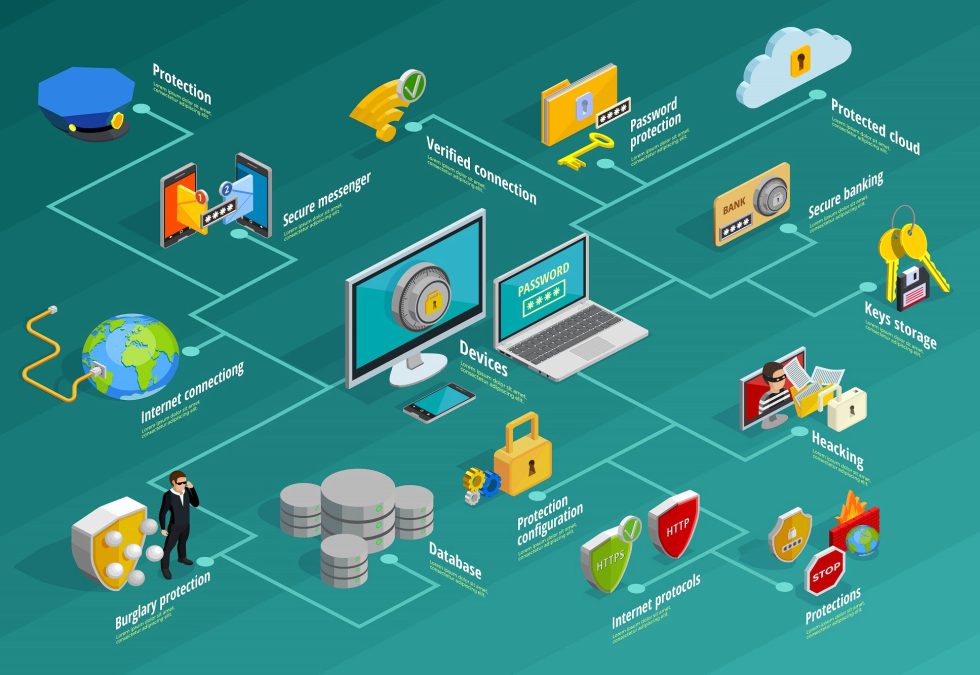Firewalls: Guardians of Business Internet Defense In today’s digital age, protecting the digital assets of businesses, securing customer information, and building defenses against online threats have become more critical than ever. This is where firewalls come into play. In this article, you will find answers to questions such as what firewalls are, what they do, and what benefits they provide to businesses.
What is a Firewall? A firewall is a barrier that protects a network or computer system against unauthorized access, malicious software, and other online threats. As the name suggests, this technology is used by businesses to safeguard and ensure the security of their information assets.
What Does It Do? Firewalls control network traffic using various levels of permissions and restrictions. Essentially, they perform the following tasks:
- Preventing Unauthorized Access: Firewalls block unauthorized entries into the network, protecting computer systems.
- Blocking Malicious Software: They provide protection against harmful software (viruses, trojans, worms, etc.) by acting as a defense mechanism.
- Network Traffic Control: They regulate network traffic by filtering out traffic that does not comply with established security policies.
- VPN and Remote Access Security: Firewalls securely manage business remote access and protect virtual private network (VPN) connections.
Benefits for Businesses:
- Information Security: Firewalls safeguard sensitive data and keep customer information secure.
- Increased Efficiency: By regulating network traffic and blocking unwanted content, firewalls enhance employee productivity.
- Reputation Protection: They act as a defense against online attacks, helping businesses gain customer trust and protect their reputation.
- Legal Compliance: By ensuring compliance with specific industry regulations, firewalls assist businesses in meeting their legal obligations.
Firewalls are a critical defense tool for businesses in today’s complex and ever-evolving threat landscape. By incorporating firewalls into their security strategies, businesses take a significant step toward protecting their digital assets.
In this article, we provided information about the fundamental functions of firewalls and the advantages they offer to businesses. Staying updated on security matters and implementing security measures tailored to the needs of the business is crucial for ensuring digital security.
“Best” firewall programs can change over time and may vary depending on the user’s specific needs. However, generally reliable and effective firewall solutions include the following popular options:
- Bitdefender Total Security: Bitdefender offers a comprehensive security package providing strong protection against malware and various additional features.
- Norton 360 Deluxe: Norton is a well-known brand with robust security features and a user-friendly interface. It includes additional features such as identity theft protection.
- Kaspersky Internet Security: Kaspersky is a popular firewall solution offering effective protection against malicious software. It also focuses on features like online banking and shopping security.
- McAfee Total Protection: McAfee provides a security package with multi-device support, strong antivirus protection, and personal security features.
- ZoneAlarm: Zone Alarm is another option that offers a user-friendly firewall. It may be suitable for both personal users and small businesses.
- Comodo Firewall: Known as a free firewall, Comodo offers advanced features and is suitable for users who want more control over their computers.
Each firewall solution may have its advantages and disadvantages, so users should choose one that suits their needs. Additionally, it is important to ensure that the software is regularly updated and provides protection against the latest threats.
Firewalls are security measures designed to protect networks or computer systems against unauthorized access, malware, and other online threats. A firewall typically operates using a set of rules and filtering methods. Here are the basic principles of how firewalls work:
- Packet Filtering: Firewalls examine data packets circulating on the network and make decisions based on predefined rules. Each data packet is evaluated according to these rules, allowing or blocking it based on security policies.
- Stateful Filtering: This method is an advanced version of packet filtering. Stateful filtering tracks the connection state and evaluates whether packets are appropriate as part of a connection. This provides a more secure and intelligent filtering method.
- Proxy Services: Firewalls can use proxy services to enable communication between users and servers. A proxy behaves like a device within the internal network, filtering communication with the external world. This helps maintain the privacy of the internal network and enforce security policies.
- Application Layer Filtering: This level of filtering examines data communication at the application layer, providing controls based on specific applications or protocols. For example, traffic for a specific application can be blocked or allowed.
- Virtual Private Network (VPN) Control: Firewalls can control VPN connections, ensuring the security of these connections. VPNs enable secure and encrypted data transmission, and firewalls can be used to secure such connections.
- Intrusion Detection Systems (IDS) and Intrusion Prevention Systems (IPS): Some firewalls include features like IDS and IPS to monitor and detect abnormal activities on the network.
These fundamental principles help firewalls control network traffic and provide protection against unauthorized access. While each firewall may differ in features and configuration options, their general purpose is to enhance network security.
The absence of a firewall can pose various risks to computer systems and networks. Here are potential consequences of not having a firewall:
- Unauthorized Access and Data Theft: Without a firewall, malicious individuals or software can gain unauthorized access to your network or computer systems, increasing the risk of sensitive information theft and malicious activities.
- Spread of Malware: Firewalls prevent the entry of malicious software (viruses, trojans, worms) into the network. Without a firewall, the likelihood of such malware infiltrating systems increases, leading to data loss and system damage.
- Vulnerability to Network Attacks: The lack of a firewall means a lack of defense against network-based attacks. There is an increased risk of becoming vulnerable to attacks like DDoS, which can disrupt network services.
- Privacy Breach: Firewalls monitor data traffic and can block access to specific content. The absence of a firewall may lead to the enforcement of privacy policies and the unauthorized viewing of sensitive information.
- Degradation of Network Performance: While firewalls can sometimes cause performance losses by controlling network traffic, the absence of a firewall may result in more significant problems and network interruptions due to malicious traffic.
- Legal and Compliance Issues: Firewalls are essential for compliance with specific legal regulations and requirements. The absence of a firewall increases the risk of non-compliance and legal issues.
Firewalls provide a preventive measure against these potential issues and are designed to enhance network security. Being vigilant about security and implementing appropriate measures is critical for protecting information systems and networks.








